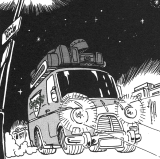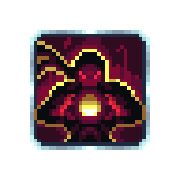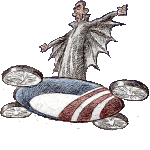|
That really is a tough choice, but I'm Team Parrot.
|
|
|
|

|
| # ? May 25, 2024 10:33 |
|
Megazver posted:Age of Sigmar has a more interesting, functional take on "there's a fire world and an earth world and a water world and a death world and" Which isn't saying much, but yeah. I think it helps that it's still Warhammer and has to justify actual armies coming from those places, which means them having civilisations, infrastructure, and things to fight over. And even then they still seem to be prone to falling into 'and then there's A MILLION BILLION SUPER SKELETONS' like an overexcited 7 year old, and not in the fun way. Also never really got what the deal with Slaad is meant to be or why the frog Xenomorph thingies are particularly chaotic.
|
|
|
|
Ghost Leviathan posted:Also never really got what the deal with Slaad is meant to be or why the frog Xenomorph thingies are particularly chaotic. True Slaad can be born in just about any physical configuration you could possibly imagine, but two of the oldest Slaad lords were terrified that some day a being more powerful than them would be generated by random chance and overthrow them, so they did a ritual that would bind subsequent generations into the frog-like form they have now, embodied in a big floating rock at the center of their traditional breeding grounds. Or something like that, I'm sure the Forgotten Realms wiki could fill in the finer details. This still admittedly leaves the question of "why frogs?" I guess Ssendam and Ygorl just thought they were neat. 
Tuxedo Catfish fucked around with this message at 19:07 on Feb 21, 2023 |
|
|
|
I more take issue with the "Neutral" half of their alignment. they seem pretty monolithically evil compared to their Lawful Neutral counterparts in Mechanus
|
|
|
|
|
This is why the astral/elemental divide is a much better version of the classical great wheel law/chaos divide.
|
|
|
|
Reading the actual cards, the Kraken has the drawback that it can turn on you and become an Epic Foe. This just makes want to take the Kraken more.
|
|
|
|
MonsieurChoc posted:Reading the actual cards, the Kraken has the drawback that it can turn on you and become an Epic Foe. This makes the Kraken / Parrot decision something of a reflection on your relationship with the rest of your gaming group. Edit: To be clear, I think it's a U-shaped curve. Bad group chemistry? Let them fight my kraken, I don't care. Excellent chemistry? Let's fight the kraken, this will be awesome. In between? Scared to deal with the repercussions of the kraken.
|
|
|
|
Alright at some point I think we, as a group, really have to address the cephalopod in the room.
|
|
|
|
Hostile V posted:Alright at some point I think we, as a group, really have to address the cephalopod in the room. Ironically this literally happened in our group last week only it was a giant frog
|
|
|
|
PurpleXVI posted:The elemental planes aren't uniform, though, they have a primary element, but also pockets of others, and near the borders, it gets more muddled. The Elemental Vacuum would in fact be a lot like space, with rare pockets of solids(asteroids, comets, minor planets) and pure fire(stars). One of the most famous parts of the Elemental Fire is a city, the City of Brass, so if that's not some differentiation in what the plane is made out of, I don't know what is, in the 2e manuals, a large section for each plane is actually devoted to what sort of "foreign" intrusions you might find there in terms of other elemental materials, what shape they take and what dangers they pose. Exactly: the only interesting parts of the Inner Planes in the Great Wheel cosmology are the parts that either come from another plane entirely or are (ahem) watered down to the point that they could be set in a region of the material world that happened to be exceptionally fiery or cold or whatever. There's very little distinguishing a cloud castle or underwater city in the material planes from one that's set in their respective elemental planes. There's nothing you can do with the plane of Earth that you couldn't do in an underground setting, with the plane of Vacuum that you couldn't do in outer space, etc. And "infinite expanse of instant annihilation" is a perfectly fine concept when it's a concept and not the basis for a quarter of the "different" planes in the cosmology.
|
|
|
|
I'm going to take the centrist position that its worth doing the paint-by-numbers rear end approach to planes because even if 90% of them are boring and stupid, a couple of funny things shook out like 'elemental nothingness' and 'elemental cops' best approach to setting design? probably not. worst approach? nah
|
|
|
gtrmp posted:Exactly: the only interesting parts of the Inner Planes in the Great Wheel cosmology are the parts that either come from another plane entirely or are (ahem) watered down to the point that they could be set in a region of the material world that happened to be exceptionally fiery or cold or whatever. There's very little distinguishing a cloud castle or underwater city in the material planes from one that's set in their respective elemental planes. There's nothing you can do with the plane of Earth that you couldn't do in an underground setting, with the plane of Vacuum that you couldn't do in outer space, etc. And "infinite expanse of instant annihilation" is a perfectly fine concept when it's a concept and not the basis for a quarter of the "different" planes in the cosmology.
|
|
|
|
|
I think it's acceptable to have a cosmology for people to believe in, even if it's not really practical to ever go there. See for example, every real world religion that has a cosmology. To put it another way, it's OK for there to be an elemental plane of coldness just to "explain" how your magic spell opens a portal to it to blast your enemies with cold, and that's where the cold comes from. Naturally you can develop more mythology about what exactly is on those planes, just to make the cosmology more interesting for you to read about or maybe add a bit of context to some esoteric discussion your nerd wizard has with another nerd wizard. Ideas like these can lead to interesting details you add to your game, too: like, we still don't want to go to the plane of cold, but because our ice blast is "actually" a portal to the cold dimension, maybe there's a 1% per casting chance that an ice elemental emerges from the portal and wrecks everything in the vicinity, or maybe you can even "reverse" this spell with some extra magic effort and use it to trap a lich for eternity. Adding more detail to your setting can be a generator for ideas that enrich play, even if many of the details don't directly affect play. This is separate from the content in a setting supplement that is intended to actually give places for adventures to happen, and it's OK with me if only some of the planes in the Manual of the Planes are worth visiting - or only certain restricted areas of specific planes are worth visiting - just spend your time building adventures there and ignore the rest as set dressing. Leperflesh fucked around with this message at 02:40 on Feb 22, 2023 |
|
|
|
Leperflesh posted:I think it's acceptable to have a cosmology for people to believe in, even if it's not really practical to ever go there. See for example, every real world religion that has a cosmology. This is a digression, but I'd love to see more fantasy settings in general where the magic/metaphysics has stronger elements of true faith, i.e. believing in things you can't empirically verify, without that making magic somehow "fake" or totally flavorless. I understand how we got from "magic and divine power is real" to the standard D&D model of "the gods and spiritual realms are all well-documented realities," but it'd be nice to have something more in the real-world religious mold. (I know Eberron tried to do this with its core human pantheon, but I didn't find any of that very interesting.) Anyone know of anything like this?
|
|
|
|
I think the most 'realistic' or at least most 'this is both D&D-ish and also seems like a real religion' is the one in the Iron Kingdoms, where there are two distinct faiths - the veneration of Menoth, the creator of humanity and law-giver guy, and Morrow, a powerful and caring saintlike figure. (There are also recurring cults to Thamar, Morrow's sister, who was also powerful, but was pretty evil. Thamar gave mankind magic, though, so it's impossible to say if she's good or bad.) Having actual Mysteries that are religious-type mysteries rather than just "defined unknowns" also means you can, legitimately and for real, have people do Forbidden Science and get that actual kick. People will reflexively hug and sympathize with the sufferings of experimental creations and have had decades of experience in cheering on necromantic horrors, but once you've defined karma as a real, literal thing in your setting - if an imperfectly understood one - it's pretty loving worrisome when there's a guy who is working on Karmatron Dynamics, and meeting with some success.
|
|
|
|
|
Antivehicular posted:This is a digression, but I'd love to see more fantasy settings in general where the magic/metaphysics has stronger elements of true faith, i.e. believing in things you can't empirically verify, without that making magic somehow "fake" or totally flavorless. I understand how we got from "magic and divine power is real" to the standard D&D model of "the gods and spiritual realms are all well-documented realities," but it'd be nice to have something more in the real-world religious mold. (I know Eberron tried to do this with its core human pantheon, but I didn't find any of that very interesting.) Anyone know of anything like this? I keep finding myself talking about this game, and I swear I'm not obsessed with it, but it's relevant again! Conan 2d20. It has gods, some directly drawn from real-world deities (like Ishtar). It has priests and clerics and other religious adherents, in the game. They have faith, and prosyletize, and influence society as you would expect. But they're not specifically magic-users, and the game does not lay out some kind of 100% clear "these gods are real but those aren't" cosmology, either. Howard was heavily influenced by Lovecraft and so there's sort of vaguely this background of Elder Gods and Black Things and all that poo poo right behind a more historically-inspired pantheon of major and minor gods; and sorcerers have to have patrons and in the game, some of those patrons are definitely some variety of deity; but what the sourcebooks lay out as far as religions are religions. You are reading about what people in the setting believe. And then for characters that use sorcery, there's just a magic system (a very flexible one) where you may learn a very small number of spells, which have a menu of options for spends you can use when you do one to modify it for your purposes or for flavor or both; and you have to do something (probably grim and at least a little evil) for your patron as payment, and also you're probably (definitely) going to eventually get eaten by a demonic entity or dragged by some tentacles into the void or something, because sorcery is Bad poo poo. So there's magic with contact with supernatural/divine beings at its source, supposedly, and there's religion, and exactly how much they intersect is left as an open-ended question that neither the players nor the GM really need to try to resolve. Yes, they may uncover something about the true nature of the giant pig-headed frog god that dwells at the center of a crumbling ancient necropolis, but that'll just be a hint, or a single factor, and at best the only use for that knowledge is to successfully escape or perhaps drive it back into its home dimension for a while. It's a far cry from having a map of the inner and outer planes and reading about who lives there and what spells they give their clerics and thumbing through the statblocks of the gods themselves, whom the PCs may eventually be powerful enough to directly challenge. To me this is one of the hallmarks of the division between "high" and "low" fantasy. Not just how much magic is in a setting, but how much the people within that setting understand the magic on what you might call a scientific level. Hedge wizards and charm builders and singed alchemists all dabble, genuine mages are extremely rare, they don't go to wizard school they have to pry secrets from dangerous sources, and just learning two or three big secrets is sufficient to be a Big Deal as far as magic goes. Rarity and a lack of structure to magic removes the impetus to try to explain it all to the reader so they can present the game setting to the players "accurately" or as a necessity for the list of 200 spells to all have their mechanics work as intended. I have not read any other low magic fantasy RPG settings though. Leperflesh fucked around with this message at 08:05 on Feb 22, 2023 |
|
|
|
It's very difficult to have a religion or magic system that "feels magical" because once it's a system it's no longer magic, it's engineering or science. I was thinking about this the other day with Delta Green and Call of Cthulhu. Once you've got a spell memorized, you activate it the same way you do every other spell in the game: make some kind of casting roll and spend some numbers off your character sheet. There might be ritual activation conditions like having a special item or a sacrifice, but the actual game mechanics are the same every time. If you really wanted to make magical spells feel like something totally beyond human understanding, you wouldn't have a system at all. You'd come up with a new mechanic every time a wizard or alien showed up, no two would be alike. The player characters might be able to replicate these powers, but it wouldn't function according to any understandable taxonomy. Problem is, "create something completely original every time" is a well that runs dry pretty fast. And it's a total nonstarter in any game where different character types are supposed to be balanced against one another. You can't take a totally random assortment of points and fit them to a power curve.
|
|
|
|
Asterite34 posted:I more take issue with the "Neutral" half of their alignment. they seem pretty monolithically evil compared to their Lawful Neutral counterparts in Mechanus Yeah, I never really understood that bit either given y'know, their whole reproductive process and all. Also absolutely about how there's nothing really in the paraelemental planes much that you actually need them to exist for when you can have like, oceans and underground and cold places in the normal world. Another thing that Mechanus actually does right there is the whole world setup literally being endless intertwined gears with steady climates- that's something that makes it interesting while also liveable. And brings up lots of questions and storytelling opportunities with just a bit of thought. There's even diversity there, you can incorporate Inevitables alongside Modrons, and Formians and probably other things- different manifestations of the same kind of ideas. Antivehicular posted:This is a digression, but I'd love to see more fantasy settings in general where the magic/metaphysics has stronger elements of true faith, i.e. believing in things you can't empirically verify, without that making magic somehow "fake" or totally flavorless. I understand how we got from "magic and divine power is real" to the standard D&D model of "the gods and spiritual realms are all well-documented realities," but it'd be nice to have something more in the real-world religious mold. (I know Eberron tried to do this with its core human pantheon, but I didn't find any of that very interesting.) Anyone know of anything like this? And there I can't help but think Discworld again, where the gods are a thing but there's also entities beyond and adjacent to them, and there are more powerful laws of the world like story structure. Problem is mostly the nerd tendency to overexplain things that don't really need explaining, and lose sight of the core thematic goals.
|
|
|
|
mellonbread posted:If you really wanted to make magical spells feel like something totally beyond human understanding, you wouldn't have a system at all. You'd come up with a new mechanic every time a wizard or alien showed up, no two would be alike. The player characters might be able to replicate these powers, but it wouldn't function according to any understandable taxonomy. In my opinion, the thing about magic isn't that it shouldn't work according to rules, it just shouldn't work according to rules that we perfectly understand. So I think it's perfectly reasonable to have the players activate it the same way every time, because they know that the pig's skull, the pack of beef jerky and the septagram are necessary ingredients. But the effect has a randomness factor because of things human users might be unable to perceive or which almost no one would consider. Like the phase of the moon, which direction the user is facing, whether a given extradimensional creature is currently awake, whether the room you're in is primarily blue or red, etc. and the spell would always have some randomness, even as the user starts to intuit some of these things "hmmm, when I cast this at 5am, it usually went well, especially if I was facing west at the same time..." even if many of the patterns they see are just random chance or unrelated things. So maybe at a low skill level, every second time they use the spell, something unexpected happens: it drags in some otherworldly cruft, there's a penalty from the Time Cops, an additional target is randomly picked and set on fire, etc. this can be either toned down with high skill level or with more ritual trappings. Like if the player spends an entire afternoon casting the spell EXACTLY like that one time it went perfectly, even down to the time of day and what song was on the radio, then there's a 99% chance it'll go well, but always a chance of some Wild Magic-esque flare-up.
|
|
|
|
Come to think about it, DCC's spell tables are a good fit for CoC's magic. EDIT: As an example, an Occultist spell from Weird Frontiers, a DCC-based Weird West game:  
Megazver fucked around with this message at 12:56 on Feb 22, 2023 |
|
|
|
This is maybe a hot take, but I've always found the needlessly detailed planar lore of D&D to be really boring in almost all of its incarnations, and a sort of sterling example of the game's love of endlessly expounding on the backstory of elements while overlooking actually incorporating those elements into the game in meaningful way. The elemental planes specifically just feel like they were created solely as an explanation for where the monster made of fire the players are going to fight in a dungeon came from, and then the developers got so wrapped up in detailing the logistics of how all of these planes fit together that they forgot that in all likelihood most parties are going to spend maybe a few at most a few sessions in The Plane Where Everything is Fire. Maybe this is just a reflection of my own, more terrestrial preferences for games of D&D, but if I run into a fire monster in a dungeon I don't need much more explanation on where it came from than "A wizard did a magic". I don't need the entire ecology of a made-up plane of existence where everything is fire.
|
|
|
|
In Conan, using a spell (as opposed to a petty enchantment or an alchemy) is a skill roll with the Sorcery skill, subject to various bonuses, and using the 2d20 system where you roll 2 dice at least but can buy more by using various individual and group resources. Unlike a normal skill roll which generates a Complication on every natural 20 rolled, spells generate a Complication on every die that isn't a success, and 2 on any natural 20s. Alternatively, the GM is entitled to make any spell casting a "test for consequences" in which the spell automatically succeeds, but every success or momentum less than the required amount for that casting the sorcerer fails to achieve, a complication is added (in addition to those generated by the dice). So basically even if you have a high Sorcery skill, all spells are dangerous and difficult spells are extra dangerous. The core rulebook has 13 spells. Here's one:  So at difficulty 1, the base spell is pretty easy for a sorcerer to cast: most PCs built to be sorcerers are going to succeed if they roll at least one die below, say, 5 or so, and will probably spend Momentum from the party pool to roll at least three or four dice. However, each time a sorcerer uses this spell they can customize it by selecting one or more momentum spends, which are effectively the same as raising the difficulty: you need additional successes to make them go. The rules also list a couple of examples, Spectral Knife and Vistas of the Imagination, which show how to construct your spell using the available spends. A PC could construct a specific modified spell using these rules and give it a name and use it regularly, or they could improvise a different combo each time. There's no specific statement in the rules about where this spell's power comes from: it might be learned by shamanic tradition, taught to an apprentice by a master, granted by divine communion, or gleaned from some crumbling text. The game does not differentiate between cleric or wizard spells, the names of things are entirely flavor, and the consequences of the use of power are Complications which the GM has a fair bit of guidance for but should be improvised to suit the fiction of the moment. This kind of magic, flavored to suit a Howard setting influenced by Lovecraft, would also fit very well into any Lovecraftian game. The 13 spells are: Astral Wanderings: wander around in your astral form, to visit places, talk to people or things, learn things, and at high momentum spend, even take possession of others. Atavistic Voyage: mentally commune with the past, including the ancient past, to learn things. Temporarily gain skills, giving you a bonus for a while in them; ask an ancestor a critical question; make a story declaration involving the history of your region Commune with the Wild: Summon, talk to, and control animals, make them do your bidding, send them forth as spies, have them guard your camp, or even cause them to attack enemies Dismember: Attempt to tear apart, wounding or killing, enemies, or (more difficultly) objects. Alternatively, assist someone with a physical healing attempt. Enslave: Initiate a Struggle with a victim, which if successful, allows you to temporarily influence or control their actions; easily make them do something they'd do normally, more difficultly make them do something dangerous, and very difficultly cause them to die. Favor of the Gods: Spend a Fortune point (which cannot be regained until this spell resolves) to entrust the casting of another of your spells to your deity or divine patrons, which will happen as a free action with another Fortune spend at a time of your choosing and/or subject to the GMs discretion. Form of the Beast: Turn into an animal, partly or entirely, or turn someone else into an animal, and spend momentum to gain abilities of the animal you are being; sustaining it with Resolve points but if you take trauma while an animal you might get stuck as one! Also use this spell to fix someone stuck as an animal. Fury of the Elements: Control the earth, opening a crack for people to fall into, raise up a cloud of dust, cause buildings or cliffs to crack or collapse, or even (D5) cause a full-blown earthquake. Haunt the Mind: see above Placate the Dead: Pay a small price in blood and treasure to calm down undead stuff, like ghosts; temporarily or permanently; or commune with the dead to seek their council Raise Up the Dead: Create necromantic minions, temporarily; take over other necromancer's undead. NPCs can have special talents not available to PCs that let them make permanent undead. Summon a Horror: Bring something from the outer dark; ask it questions, attempt to bind it to your service for a time, attempt to control its actions; or also use this spell to banish horrors. Venom on the Wind: Control the weather via supernatural influences, anything from making it overcast for a bit to invoking a hurricane; or also use this spell to calm the weather a bit. Controlling the weather is hard and likely to lead to lots of complications. That's the whole list, although supplements (particularly the Book of Skelos) add a few more. A given PC probably knows 1 spell at character creation and getting more requires binding yourself to additional pacts with one or more patrons, which add to the RP and story hooks.
|
|
|
|
PurpleXVI posted:In my opinion, the thing about magic isn't that it shouldn't work according to rules, it just shouldn't work according to rules that we perfectly understand. One of the GBA Fire Emblem games, Sacred Stones I think, has a discussion of the philosophical differences between light and dark mages and their magic. The priest is an emissary of the gods; his magic comes from faith. The witch is a student of the forbidden; her magic comes from doubt. You could extend this out to a lot of fantasy settings: for most purposes, it's impossible to observe how magic functions. Consider the core D&D casters. The magic of clerics and paladins comes from faith in the gods; druids and rangers, faith in natural spirits and the balance of things; bards and sorcerers, faith in themselves. It Just Works, unless examined too closely, at which point It Just Don't Work. Warlocks have a relationship with a being of incredible cosmic power based on something like trust, and a sure way to violate that trust is to start asking questions about the source of that cosmic power. You can have fun with this, depending on the patron: looking too closely at the mechanics of a spell violates Article IV of the devilís bargain, or causes the archfey to change how the spell works, or demands a sanity check from the Great Old One. Wizards are the nerds who would actually talk about the arcane uncertainty principle: magical phenomena becomes impossible to examine or explain beyond a certain point, which is an extremely convenient way to hand-wave poo poo the DM doesn't feel like explaining further.
|
|
|
|
At the risk of simply inverting the cliche, system isn't physics.  Rules that are indeterminable are generally just bad game design. Rules that represent something narratively indeterminable and are determinable themselves, at least to the extent necessary for the GM to adjudicate them and for players (not characters) to rely upon their effects, should be more or less the default. Similarly, there's nothing inherently magical or mysterious about randomness. Plenty of physics is functionally "random" as soon as you apply even a little bit of abstraction to it. It isn't even a particularly good way to make magic feel narratively unpredictable, unless you're playing something where players are expected to have an extremely high degree of identification with their character vs. authorship over their character -- which you could do, it's a perfectly legitimate approach, but not the one I would take if I were specifically trying to get away from D&Disms. e: basically i like the Conan example a lot more for the part where it gives the player a button labeled "purchase [rigorously defined mechanical effect X] in exchange for [open-ended narrative trouble Y later]" and less for the part where it's like "if you roll a nat 20 your wizard explodes" Tuxedo Catfish fucked around with this message at 20:42 on Feb 22, 2023 |
|
|
|
All magic really needs is to be mysterious and inscrutable to outside observers. This is one of the reasons I like Mage: the Awakening so much; if you think about what a mage looks like from a regular person, you realize that they're seemingly normal except with some behavioral quotes and really strangely well-informed as well as bizarrely lucky as the stakes rise. You can kind of logically connect some of the weird stuff they do to the benefits they enjoy (you know, he seems to always glance into that pocket mirror and mutter something before telling us which branch in the road to take...) but the underlying mechanics of what's happening aren't apparent to you and to the extent they ever became so you'd do some combination of forgetting and going insane.
|
|
|
|
Frankly I believe the term magic as meaning "mystically unknowable" is an element of cultural baggage of which the term can and does exist independently. An artifact of real world culture, certainly, but not necessarily one a fictional culture must also be beholden to. If it eases your mind you can put that wall up and use pseudoscientific terms to obfuscate that magic is just magic but understood in scientific terms, but literally anybody can see that "oh okay that's just magic, got it."
|
|
|
|
KingKalamari posted:This is maybe a hot take, but I've always found the needlessly detailed planar lore of D&D to be really boring in almost all of its incarnations, and a sort of sterling example of the game's love of endlessly expounding on the backstory of elements while overlooking actually incorporating those elements into the game in meaningful way. The elemental planes specifically just feel like they were created solely as an explanation for where the monster made of fire the players are going to fight in a dungeon came from, and then the developers got so wrapped up in detailing the logistics of how all of these planes fit together that they forgot that in all likelihood most parties are going to spend maybe a few at most a few sessions in The Plane Where Everything is Fire. I think the problem is that D&D always presents everything as an option of where you can go have an adventure, and having 26 inner planes or so statted out does start to seem excessive there, especially, as has already been noted, most of them are just lethal on arrival and so they can only be used as "stuff outside the window of powerful magical fortresses." That said, having the cosmology of the inner planes is super cool, it lets you have set dressing like crazy orreries or collections of weird globes and stuff on the desks of nerdy elemental obsessed wizards, all making calculations about how ooze is currently out of its usual diametric phase alignment from the Ash Planes or whatever could be super cool. Having specific mechanics for how Dust, Salt, Radiance, and Plasma planes instantly murder you (but here's the stats for those quasits anyway) is way less interesting than the story stuff you can squeeze out of it.
|
|
|
|
Tuxedo Catfish posted:there's nothing inherently magical or mysterious about randomness. Rolling a d20 with a chance to gently caress up disastrously whenever you want to do something doesn't make the wizard "feel magical", it makes the wizard feel like the fighter.
|
|
|
|
Runa posted:If it eases your mind you can put that wall up and use pseudoscientific terms to obfuscate that magic is just magic but understood in scientific terms, but literally anybody can see that "oh okay that's just magic, got it." as demonstrated so expertly by Mass Effect (element zero) and Metal Gear Solid (nanomachines)
|
|
|
|
I mean for RPGs its always going to be really tricky, right? Like the stuff that Thulsa Doom and Gandalf do feels magical, but a lot of that is that its so hard to understand. And there's even a bit of a debate about what it means for something to be magic at all - we live in a very scientistic culture, and we tend to divide between "natural" and "supernatural," with "natural" meaning "explicable and repeatable" and "supernatural" meaning not that, but another viable divide (first heard from Abigail Thorne for me) is that magic is "getting something for nothing." The trick about either of those notions for designing a TTRPG is that if its not explicable or repeatable, how the gently caress are players supposed to interact with it in any meaningful way, and if its "something for nothing" then you raise the horrifying specter of game balance discussions. I'm not actually super bothered by "magic is engineering by another name," since what I think actually winds up happening is that you open the window for players to functionally play an engineer that is much smarter than they are, without having to worry about somebody who actually knows engineering from wrecking your poo poo. Depending on the type of setting this can even be fine really, if there's anything like a wizard college then that means magic is at least somewhat akin to some sort of natural science on different principles, even in settings as as magical as Earthsea. I think ultimately the issue is that a Gandalf or Thulsa Doom is kind of just a bad PC at the basic level, one's very much a DMPC and the other is just such the archetype of a recurring villain.
|
|
|
|
Tuxedo Catfish posted:e: basically i like the Conan example a lot more for the part where it gives the player a button labeled "purchase [rigorously defined mechanical effect X] in exchange for [open-ended narrative trouble Y later]" and less for the part where it's like "if you roll a nat 20 your wizard explodes" Complications aren't lethal, and are build into the whole game at every level: they're independent of success/failure and provide the GM with a choice of either adding something to the scene immediately to make things difficult, or, adding tokens to the doom pool (which the players can see and count) to spend on making things difficult later. If your Conan wizard is doomed, it's entirely due to making choices that your player has spelled out for them from the outset - thematically, wizards in this setting are a representation of the corruption of civilization and the relentless thirst for power as opposed to the moral purity of savagery and an acceptance of man's place in the natural world, which is fundamentally what Conan was all about for Howard. This implementation makes concessions to the notion that players at a table aren't necessarily always trying to play out that specific theme, and part of that is Sorcery is just one skill on the list and just one talent tree of several: nobody has to be "just a sorcerer" and mostly no characters in Conan are so focused on one particular aspect of the game that they're incapable in the rest. Sorcerers have access to alchemy and petty enchantments, and the expectation is that breaking out the big guns is reserved for the big targets or key inflection points in the narrative. But at the risk of being repetitive: complications aren't "your wizard explodes" but they may be "you lose some resource" or "you are injured" or "some more enemies show up" or perhaps specific to the spell being used, like complications of a Raise Up the Dead might be that the skeleton you just created only has one arm, or is one of your enemy's grandpa, or it smells so bad your companions are gagging, or as it crawls from the ground it leaves a crumbling sinkhole that has become a hazard in the combat. Long-term yeah if you keep playing and accumulating patrons and seeking power, their demands are going to become increasingly onerous or morally gray, and eventually you may be like "should I sacrifice a hundred people on this altar to bind this elder demon to my will y/n guys does this seem fine? it seems fine to me" and now you are definitely making a choice about how your wizard is going to leave the game. mellonbread posted:This is a much more succinct articulation than the one I was about to type up. And yeah if we remove the word "disastrously" here, it literally does, in that powerful spells having a higher chance of rolling complications is consistent with other characters trying very risky things to get big flashy outcomes, including characters who have focused more on combat. So less "summoning a demon is just as risky as making a basic attack with a sword" and more "summoning a demon is about as risky as that time last adventure when Belit bought three dice with three Momentum, spent all of the uses of her poison alchemy kit, and tried to take out the entire enemy vanguard with an improvised poisonous cluster bomb". Anyway this is beside the point, which is that "magic" can be implemented in a way that is very flexible in practice while also not creating the impression of a standardized system that can be scientifically investigated and codified and taught to math nerds in magic school and used to convert the infrastructure of your society, or notably and incongruously not used that way even though every town in the world is crawling with mages who could all easily learn Create Public Transit by studying and memorizing these six specific spells conveniently writable to identical scrolls and castable without risk of failure. Not that there's anything wrong with that, Eberron is very cool! It's just another I think strong influence of how magic has worked in D&D, where risk-free "utility spells" have always existed and worked consistently and imply things about the setting.
|
|
|
|
Tulip posted:The trick about either of those notions for designing a TTRPG is that if its not explicable or repeatable, how the gently caress are players supposed to interact with it in any meaningful way, and if its "something for nothing" then you raise the horrifying specter of game balance discussions. For me, what is different about Conan and I suppose other systems like it - "low magic" or more improvisational/flexible magic system, whatever - is that a specific magical effect may be consistently repeatable for that PC without having to imply universal portability. Thulsa doom turns into a giant snake, but that doesn't have to mean that there's a universal "turn into a giant snake" spell, which works by pulling 150 Large Serpention Particles from the Reptile Dimension, costing exactly and conveniently 200 gold coins worth of Serpentinite, a spell which you can find for sale on a scroll in any good spell shop across the multiverse. Even if the source book has a Turn Into Animals spell, so that all of the senior cultists in Doom's cult can also turn into giant snakes using a mechanism that gives the PCs some sense of consistency during this particular adventure... when Doom is defeated and his cultists thrown down, we could reasonably believe that that's the end of this particular grotesque horror or at least that the knowledge of snake transformation is now lost. We don't have to naturally conclude that: magic used by enemies is available somehow to the PCs, or vice-versa: that magic is fungible and universal; that sources of magical knowledge or power are interchangeable; that, fundamentally, magic "works" in a specific way due to specific rules of the universe. The mechanics in the sourcebooks are abstractions and tools we use to try to create a particular tone and theme to the game; we err when we claim that our characters can infer the existence and quantity of their own hit points or armor class or level, but in games like D&D the systems of magic are actually built into the setting in a way that PCs and NPCs can investigate and reach rational conclusions about. All wizards capable of casting Bigby's Hand are of a certain specific quantifiable "level" because the divide is so stark and sharp. Fire Elementals aren't as mysterious once we learn that they all originate from the elemental plane of fire, and we learn that planar travel is available via specific technologies, and we can go to that plane and take its temperature and write it in a book and publish it. Leperflesh fucked around with this message at 00:30 on Feb 23, 2023 |
|
|
|
GURPS lets you build unique powers for any character by combining advantages, disadvantages, and modifiers to achieve the effect you like. Every character in your setting could have one or more special and unique powers that don't imply any sort of portability across individuals that the usual a la carte magic in a lot of other games does. I like GURPS a lot but for people who don't want that level of crunch you could still have a simpler system that still has a power building system that allows everyone to do their own unique and wondrous things.
|
|
|
|
BattleMaster posted:GURPS lets you build unique powers for any character by combining advantages, disadvantages, and modifiers to achieve the effect you like. Every character in your setting could have one or more special and unique powers that don't imply any sort of portability across individuals that the usual a la carte magic in a lot of other games does. reminds me of how superpowers work in some points-buy games, where you're expected to mix & match choices to create an amalgamated power that is (perhaps) unique to your character. We don't have to expect that just because Taffy Man can shoot streams of taffy from his fingertips, that means anyone else can do that, even if we built this power by combining a 'level 2 exude effect' with an 'edible' modifier, a 'stickyness' modifier, and an 'attracts ants' drawback. Within the fiction, PCs and NPCs are supposed to treat Taffy Man's powers as novel and irreproducible.
|
|
|
|
Magic also opens the bottle of "what is possible with magic?", which, if it's "anything", means giving the magicians control of the setting. Not horrible if all players have the hands on it, but not as much fun if only some of them do.
|
|
|
|
The best magic system is the one that accurately evokes the tone of your setting. Very few settings intentionally have the tone "there's this guy who only has one skill and that skill comes with a statistically significant chance of killing everyone in a 50 foot radius and also we're voluntarily hanging out with him".
|
|
|
|
Leperflesh posted:reminds me of how superpowers work in some points-buy games, where you're expected to mix & match choices to create an amalgamated power that is (perhaps) unique to your character. We don't have to expect that just because Taffy Man can shoot streams of taffy from his fingertips, that means anyone else can do that, even if we built this power by combining a 'level 2 exude effect' with an 'edible' modifier, a 'stickyness' modifier, and an 'attracts ants' drawback. Within the fiction, PCs and NPCs are supposed to treat Taffy Man's powers as novel and irreproducible. Yeah, the Powers system in GURPS is most obviously applicable to Supers characters but can be used to build powers of any nature including psionic, magic, physical (alien biology or you are a robot/have robot parts or your body is a colony of nanomachines, etc.), god powers, elemental bending, or whatever. Of course GURPS' base content is designed to be as generic as possible and as malleable as possible, but if your goal was to make a game of a very specific theme you could design a power building system that is a lot more tailored to that.
|
|
|
|
ninjoatse.cx posted:Magic also opens the bottle of "what is possible with magic?", which, if it's "anything", means giving the magicians control of the setting. Not horrible if all players have the hands on it, but not as much fun if only some of them do. I honestly really like how magic works in Wicked Ones, which is actually pretty close to "magic can do anything." But kind of similar to what Leperflesh was saying, magic in total has that ability, but no one magic caster can do all possible things that magic allows, and magic necessarily comes with costs and limitations above and beyond doing things the non-magical ways. I do think that the game really should spell out better how to establish those limits, but the intent is pretty clear that magical solutions are going to trade flexibility along one dimension for losing flexibility along another dimension.
|
|
|
|
Honestly, all of the school specialist casters in 3.5 like Beguiler, Dread Necromancer, etc. were much more interesting than wizards or clerics. Sure, you can beguile men's minds, but how do you solve the problem of getting over a really tall cliff when all you know is brain magic. It's a shame they never really tried something similar with clerics. There's a lot of room for "gets domain spells and actual class features" clerical classes instead of "gets every spell ever printed and also some bonus spells I guess" clerics.
|
|
|
|

|
| # ? May 25, 2024 10:33 |
|
I touched on this in the F&F thread - Spheres of Power, a Pathfinder third-party supplement, replaces the entire magic system of PF with its own, that's centered on breaking up magical effects into discrete "spheres", where you start with a basic "blast a target with a bolt of energy for 1d6 damage", and then you build upwards from that, whether it's turning it into an AOE, customizing the damage type, customizing the energy type, making it long-ranged, and so on and so forth. but Spheres of Power also has an optional rule, called Spellcrafting, which essentially cordons off magic into specific, one might say artisanal, combinations of a Sphere effect plus its accompanying modifiers that is, by default, you could maybe start with a Destructive Blast as a base effect, and then pick-and-choose between applying the Explosive Orb (turn the blast into a Burst) effect, the Extended Range effect, or the Nether Blast (make the blast apply Negative Energy), as long as you've learned those three talents but with spellcrafting, you might say that only the specific combination of a Destructive Blast + Nether Blast exists in the world. You might even say that this spell only exists as a scroll, that must be acquired from some Undead dungeon, before it can be learned ___ I guess my point here is that, just because the magic system in the game is modular, doesn't mean that the player-characters are necessarily privy to being able to exploit that modularity, in-universe
|
|
|










































